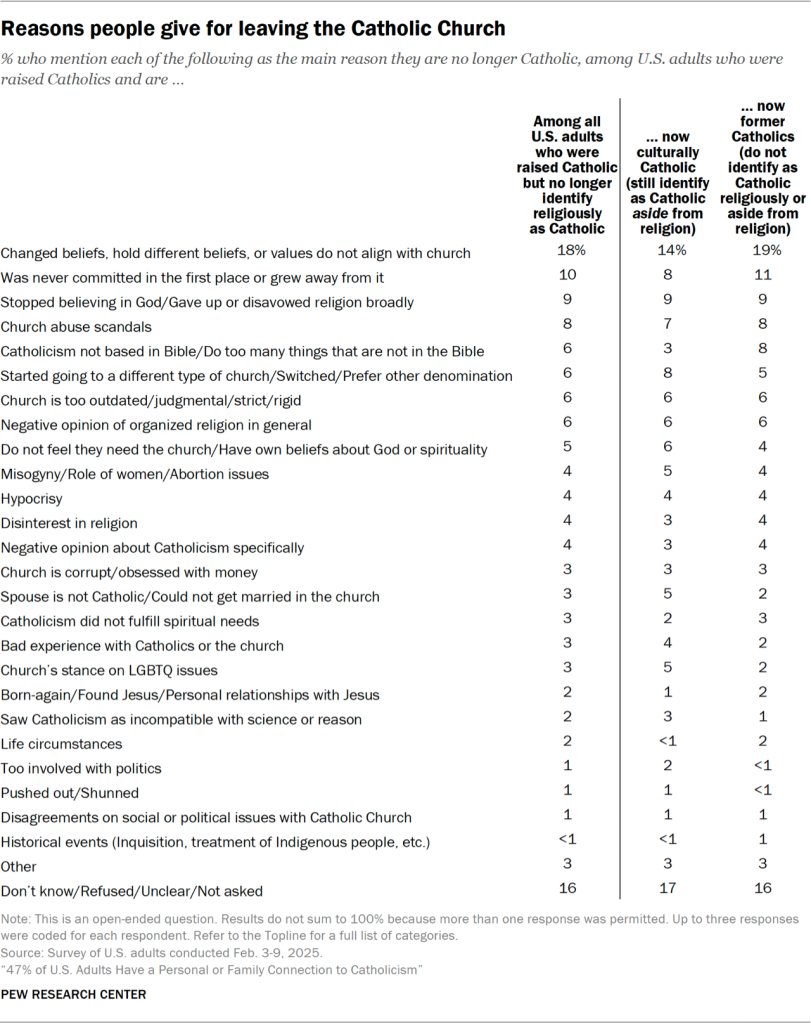In the United States, there are almost as many “cultural Catholics” and former Catholics, combined, as there are people who identify religiously as Catholic. In our Feb. 3-9, 2025, survey, 20% of U.S. adults are Catholic by religion, meaning they say they are Catholic when asked about their religion. Throughout this report, we refer to this group simply as “Catholic.”
Meanwhile, 18% of U.S. adults are not Catholics by religion, but they are either cultural Catholics (9%) or former Catholics (9%). By “cultural Catholics,” we mean people who say in the survey that they are Catholic “aside from religion,” for example, ethnically, culturally, or because of their family background, but who do not say they are Catholic when asked directly about their religion. We define “former Catholics” as people who were raised Catholic but who don’t identify as Catholic today, either religiously or “aside from religion.”
Additionally, another 9% of U.S. adults are connected to Catholicism in other ways. These are people who don’t fit into the Catholic, cultural Catholic or former Catholic categories, but who have a Catholic parent, spouse or partner, or say “yes” when asked whether they ever attend Catholic Mass.
About half of both cultural Catholics and former Catholics are religious “nones,” meaning they describe themselves as atheist, agnostic or “nothing in particular” when asked about their present religion. The remainder of people in these groups identify with a religion other than Catholicism (mostly with other Christian groups).
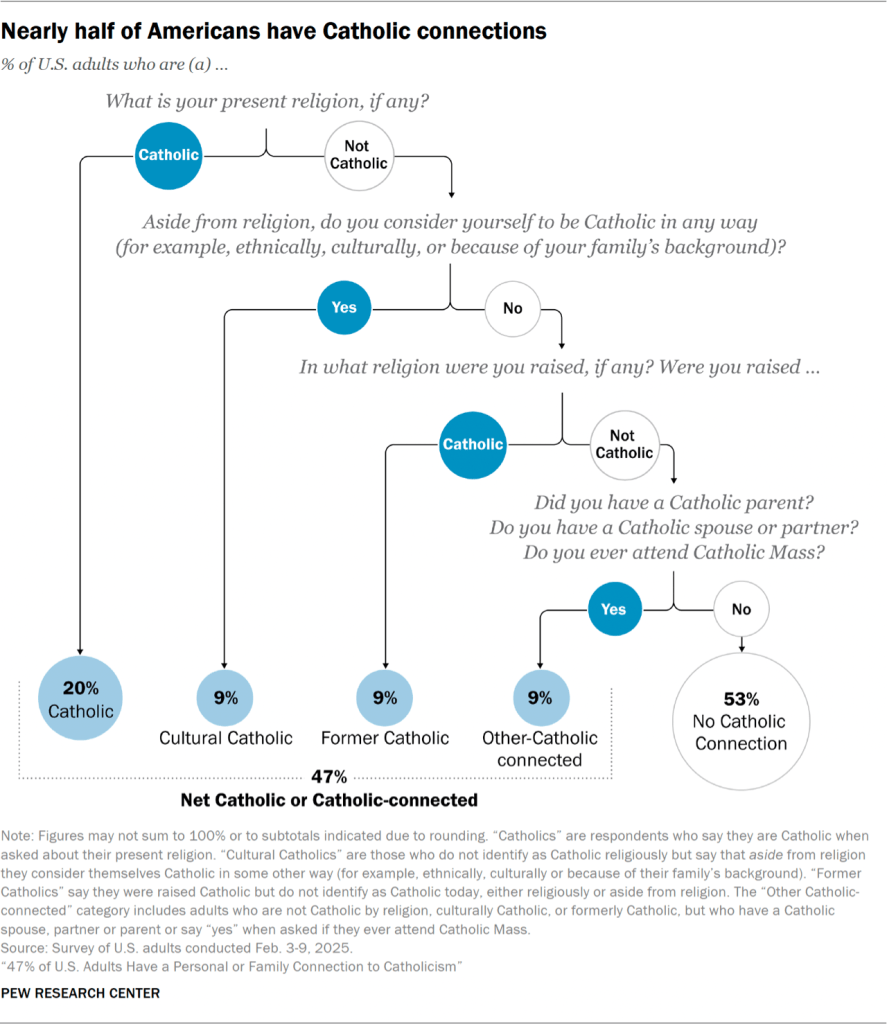
The rest of this chapter provides more information about:
- ‘Cultural Catholics’ and former Catholics
- Why ‘cultural Catholics’ say they identify as Catholic ‘aside from religion’
- Other Catholic connections
- Reasons people give for leaving the Catholic Church
Cultural Catholics and former Catholics
Today, 53% of “cultural Catholics” identify with religions other than Catholicism, including 47% who are part of other Christian traditions and 7% who identify with non-Christian religions. The remainder of cultural Catholics (47%) are religiously unaffiliated.
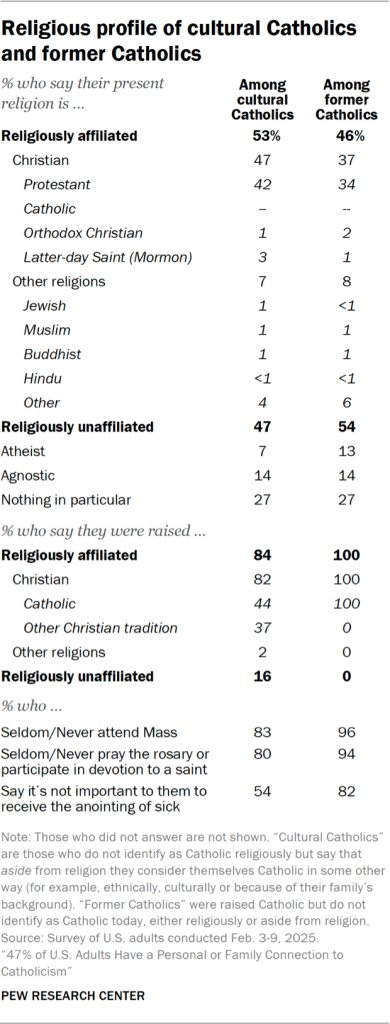
Looking at former Catholics, 46% identify with religions other than Catholicism, including 37% who are in other Christian traditions and 8% who identify with other (non-Christian) religions. About half of former Catholics (54%) are religiously unaffiliated.
How they were raised
Among cultural Catholics, 44% say they were raised Catholic, while 37% were raised in other Christian traditions and 16% were raised religiously unaffiliated.
By definition, 100% of former Catholics were raised Catholic.
Their religious practices today
The vast majorities of cultural Catholics and former Catholics are not involved in Catholic practices today. Indeed, 83% of cultural Catholics and 96% of former Catholics say they seldom or never attend Catholic Mass. Eight-in-ten cultural Catholics and 94% of former Catholics say they seldom or never pray the rosary or participate in devotions to Mary or other saints.
Furthermore, 82% of former Catholics say it would be “not too important” or “not at all important” to them to receive the anointing of the sick if they were seriously ill. This figure is somewhat lower among cultural Catholics (54%). Among cultural Catholics, 8% say receiving the anointing of the sick would be “extremely” or “very” important to them, while 18% say it would be “somewhat” important and 19% say they are not sure.
Why do cultural Catholics say they identify as Catholic ‘aside from religion’?
The survey asked cultural Catholics to describe, in their own words, in what way they consider themselves Catholic. The most common type of response describes having some sort of Catholic background (32%), such as having been raised Catholic, having cultural or ethnic ties to Catholicism, or having attended Catholic school.
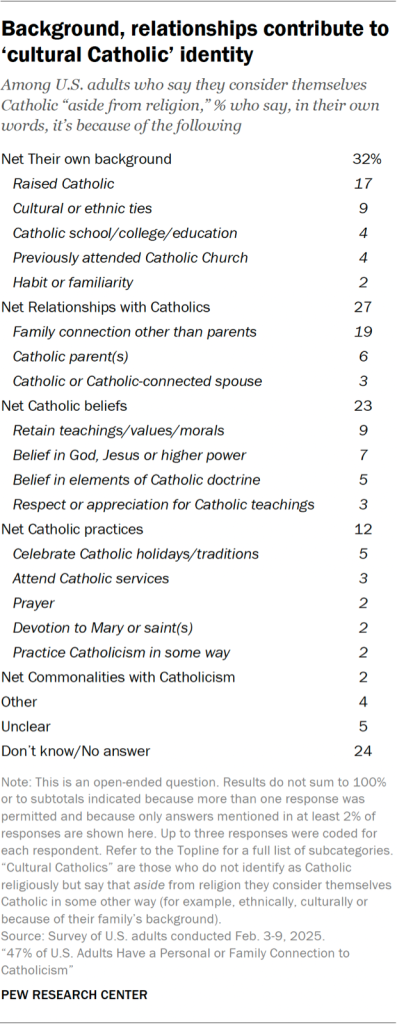
Many cultural Catholics also describe relationships with Catholics (27%) as contributing to why they consider themselves Catholics. For instance, these respondents point to having Catholic parents, extended family members, friends or spouses.
Additionally, 23% of cultural Catholics mention beliefs that connect them to Catholicism, such as belief in God or elements of Catholic teaching. And 12% mention practices related to Catholicism, such as celebrating holidays, attending Mass or prayer.
The survey also asked cultural Catholics whether each of a series of beliefs, practices and other traits are “essential” to what being Catholic means to them, “important but not essential,” or “not an important part” of what being Catholic means to them.
Overall, 44% say having a personal relationship with Jesus Christ is essential to what being Catholic means to them, and 41% say the same about “working to help the poor and needy.” Roughly three-in-ten (28%) say caring for immigrants is “essential” to their Catholic identity, and an identical share mention “taking care of the environment.”
Compared with Catholics by religion, smaller shares of cultural Catholics say most of the items asked about in the survey are essential to what being Catholic means to them. (For a description of how people who identify religiously as Catholic answered this question, jump to Chapter 1.)
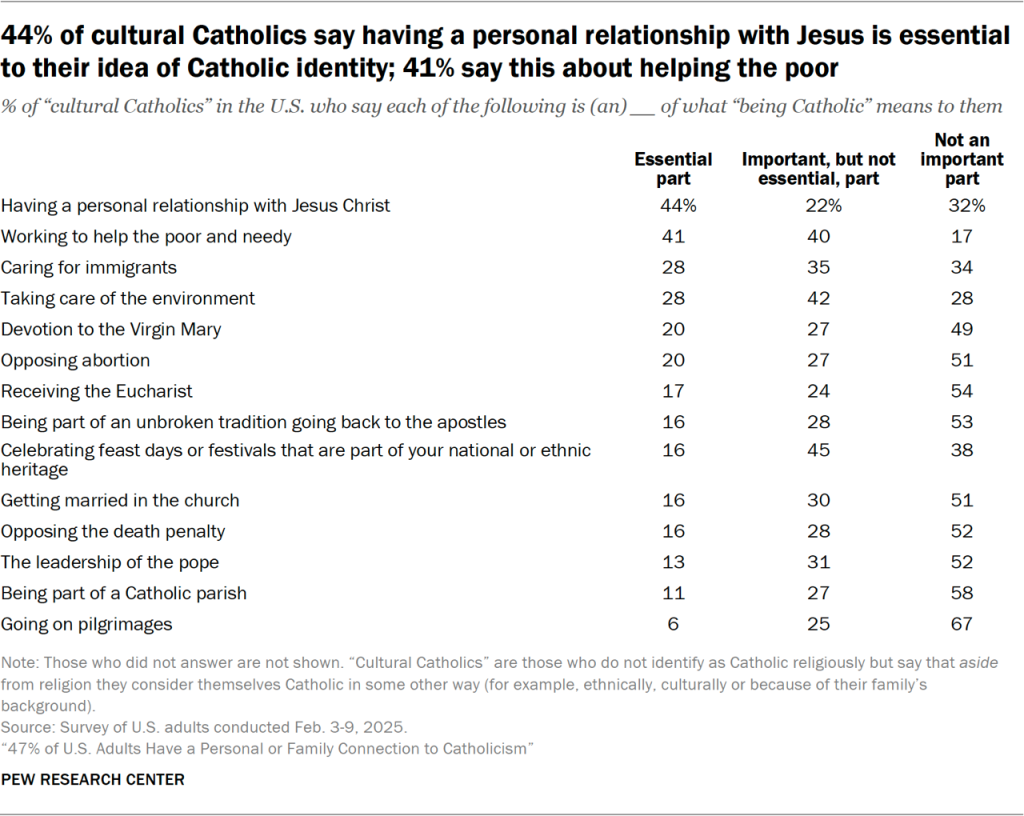
Other Catholic connections
Overall, the survey finds that 9% of U.S. adults are connected to Catholicism in ways other than being Catholic by religion, culturally Catholic, or formerly Catholic. To put it another way, people in this group do not fit into any of those three categories but they do have a Catholic parent, spouse or partner or they say “yes” when asked whether they ever attend Catholic Mass.
More than half (57%) of the people in this group have a Catholic parent. Roughly one-third say “yes” when asked whether they ever attend Catholic Mass. And 25% have a Catholic spouse or partner.
In total, 13% of people in this group have more than one of these kinds of connections to the faith.
Reasons people give for leaving the Catholic Church
Overall, 13% of all adults in the U.S. population say they were raised Catholic but that they no longer religiously identify as Catholic. The survey asked people in this group an open-ended question: “What is the main reason you are no longer Catholic?”
Overall, 18% of the people answering this question cite changed beliefs as the main reason they left Catholicism or say they hold different beliefs than the church. An additional 10% say they were never particularly committed to the church to begin with, and/or that they grew away from it. Another 9% say they stopped believing in God or left religion altogether, and 8% mention abuse scandals in the church as the key factor.
